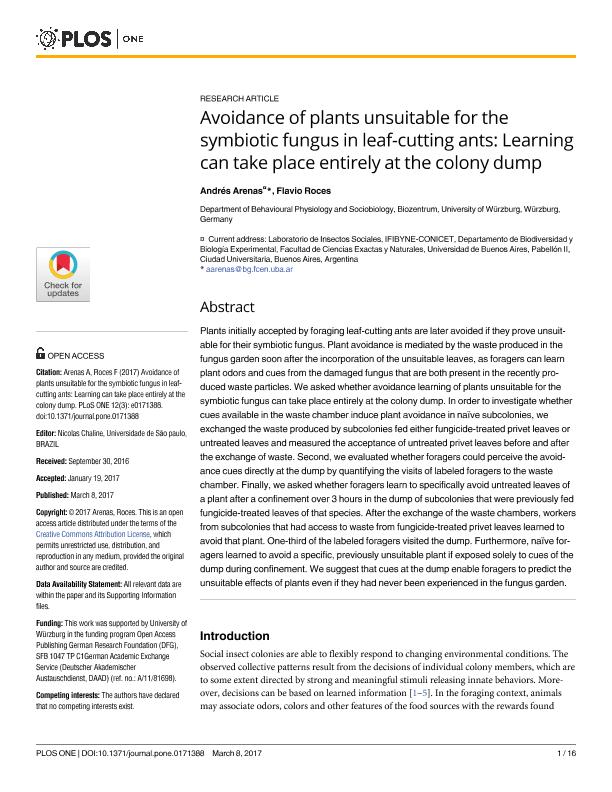Artículo
Avoidance of plants unsuitable for the symbiotic fungus in leaf-cutting ants: Learning can take place entirely at the colony dump
Fecha de publicación:
08/03/2017
Editorial:
Public Library of Science
Revista:
Plos One
ISSN:
1932-6203
Idioma:
Inglés
Tipo de recurso:
Artículo publicado
Clasificación temática:
Resumen
Plants initially accepted by foraging leaf-cutting ants are later avoided if they prove unsuitable for their symbiotic fungus. Plant avoidance is mediated by the waste produced in the fungus garden soon after the incorporation of the unsuitable leaves, as foragers can learn plant odors and cues from the damaged fungus that are both present in the recently produced waste particles. We asked whether avoidance learning of plants unsuitable for the symbiotic fungus can take place entirely at the colony dump. In order to investigate whether cues available in the waste chamber induce plant avoidance in naïve subcolonies, we exchanged the waste produced by subcolonies fed either fungicide-Treated privet leaves or untreated leaves and measured the acceptance of untreated privet leaves before and after the exchange of waste. Second, we evaluated whether foragers could perceive the avoidance cues directly at the dump by quantifying the visits of labeled foragers to the waste chamber. Finally, we asked whether foragers learn to specifically avoid untreated leaves of a plant after a confinement over 3 hours in the dump of subcolonies that were previously fed fungicide-Treated leaves of that species. After the exchange of the waste chambers, workers from subcolonies that had access to waste from fungicide-Treated privet leaves learned to avoid that plant. One-Third of the labeled foragers visited the dump. Furthermore, naïve foragers learned to avoid a specific, previously unsuitable plant if exposed solely to cues of the dump during confinement. We suggest that cues at the dump enable foragers to predict the unsuitable effects of plants even if they had never been experienced in the fungus garden.
Palabras clave:
Leaf-Cutting Ants
,
Olfactory Learning
,
Delayed Avoidance
,
Waste Chamber
Archivos asociados
Licencia
Identificadores
Colecciones
Articulos(IFIBYNE)
Articulos de INST.DE FISIOL., BIOL.MOLECULAR Y NEUROCIENCIAS
Articulos de INST.DE FISIOL., BIOL.MOLECULAR Y NEUROCIENCIAS
Citación
Arenas, Andres; Roces, Flavio; Avoidance of plants unsuitable for the symbiotic fungus in leaf-cutting ants: Learning can take place entirely at the colony dump; Public Library of Science; Plos One; 12; 3; 8-3-2017; 1-16; e0171388
Compartir
Altmétricas




